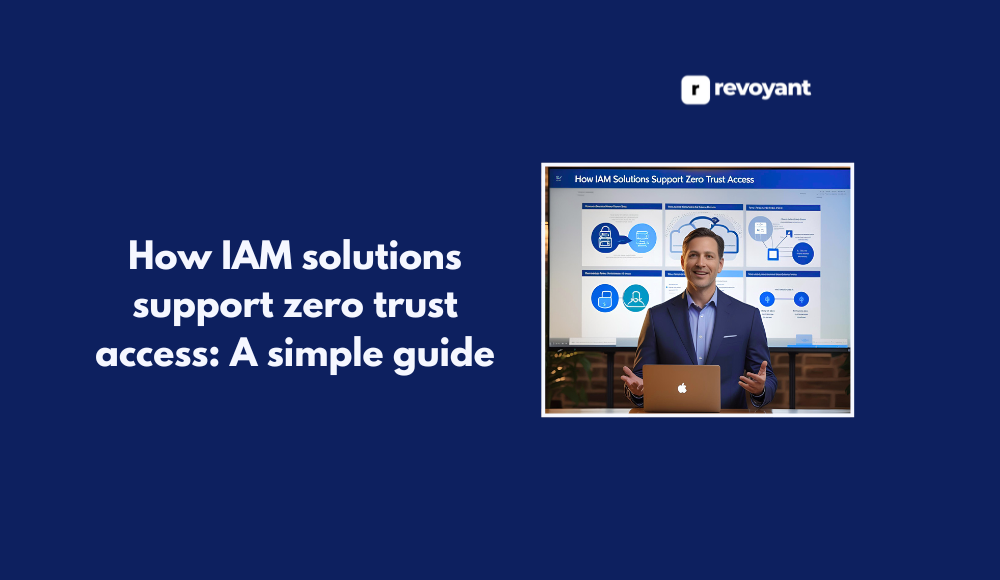⚡ Why This Blog Matters
Wondering if your face is floating around the web—or want to verify someone’s identity online? FaceCheck ID delivers fast, accurate face-based searches using AI-powered facial recognition.
🧠 What You’ll Learn Here
Learn how to upload a photo and scan thousands of public profiles, social sites, and forums; get match previews with context; set alerts for future appearances; and explore pricing based on credits rather than subscriptions. :contentReference[oaicite:1]{index=1}
🎯 Who Should Read This
Perfect for online daters, job screeners, privacy‑conscious individuals, and investigators wanting to verify identity, detect impersonation, or monitor image misuse. :contentReference[oaicite:2]{index=2}
In a world where almost everything is searchable, one thing that’s been surprisingly hard to trace is a person’s face. That’s where tools like FaceCheck ID come in. Whether you’re verifying someone’s identity, checking if your photos are being misused, or simply curious about where your face appears online, this AI-powered face search tool makes it fast and simple.
FaceCheck ID is gaining attention not just for what it can find, but for how easy it is to use. With just one uploaded photo, the tool scans across a wide range of online sources—from public profiles to social sites—helping users get results that used to take hours of digging.
In this blog, we’ll explore what FaceCheck ID really offers, how it works, and who it’s best for. If you’re looking for a smart, efficient way to do face-based searches online, this guide will help you decide if it’s the right choice.
Key Takeaways: Why FaceCheck ID Is Changing the Face of Online Search
- FaceCheck ID is a powerful AI tool that helps you find where a face appears online using facial recognition technology.
- It’s easy to use. You simply upload a photo, and the system searches across websites, forums, and social media platforms for possible matches.
- Popular use cases include verifying online profiles, spotting fake identities, and protecting your own digital presence.
- It stands out for its speed, accuracy, and intuitive design, making it accessible even for non-technical users.
- FaceCheck ID offers a unique advantage over traditional reverse image searches by focusing entirely on facial data.
- The tool raises important privacy considerations, so it’s essential to use it responsibly and understand where and how results are sourced.
What is FaceCheck ID and How Does It Work in 2025?
FaceCheck ID is an AI-powered face search engine designed to help users find where a face appears online. You simply upload a clear photo, and the system scans thousands of websites, public profiles, and online platforms to return possible matches. It works like a reverse image search, but it’s built specifically for faces.
Unlike traditional search engines that rely on text or image metadata, FaceCheck ID uses advanced facial recognition technology. That means even if someone’s name or other details are hidden, the system can still identify potential matches based on facial features alone.
People use FaceCheck ID for different reasons. Some want to verify a social media profile, others are checking if their own images are being used without permission. For many, it’s a simple way to take more control over how their face appears on the internet.
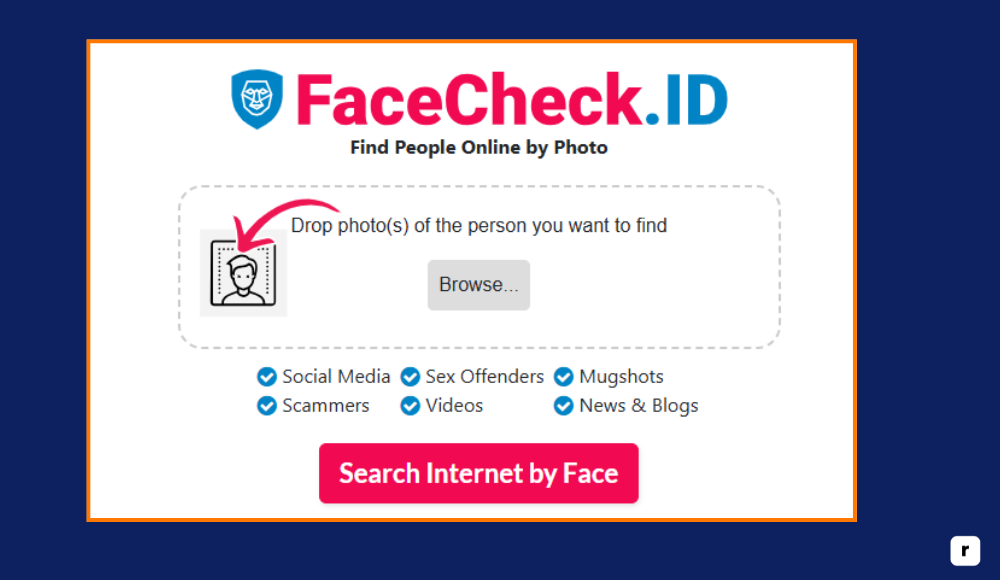
Who Uses FaceCheck ID (And Why It’s a Game-Changer for Them)
FaceCheck ID appeals to a wide range of users, from everyday individuals to professionals in security, hiring, and online safety. Its simplicity and speed make it accessible, while its depth and accuracy make it valuable for serious tasks. Whether you’re protecting your identity, researching someone online, or conducting due diligence, FaceCheck ID has become a go-to tool for people who need fast, reliable face-based search results.
Protect Your Digital Identity: How FaceCheck ID Helps Everyday Users
Everyday users turn to FaceCheck ID to check where their face appears online. Whether it’s concern over privacy, fear of impersonation, or curiosity about whether someone is using their photo without permission, this tool gives users more visibility and control.
It’s especially helpful for people who’ve had their photos taken from social media or dating profiles and repurposed elsewhere. With one quick search, individuals can find out if their face is showing up in places they didn’t expect—and take the next steps with more confidence.
Catch Fake Profiles Fast: FaceCheck ID for Verifying Online Connections
In an age of online dating, remote work, and digital networking, verifying someone’s identity is more important than ever. FaceCheck ID is used by people who want to confirm whether the person they’re talking to online is who they claim to be. By uploading a photo, users can check if that face appears elsewhere under different names or in unrelated contexts.
It’s a useful step to avoid falling for fake profiles, romance scams, or catfishing. For anyone forming new online connections, this tool acts like a digital gut-check before getting too invested.
FaceCheck ID for Journalists & Investigators: Verify Visual Identities Instantly
Journalists, fact-checkers, and investigators often need to trace identities, verify sources, or dig into a person’s digital footprint. FaceCheck ID helps speed up that process by finding visual matches and linking them to real online content. It can reveal if a person’s photo is tied to other aliases or websites, giving journalists leads to follow in their research.
For digital investigations where accuracy and efficiency matter, this tool has become a practical resource. It turns hours of manual image searching into a few minutes of targeted scanning.
HR & Recruiters: Use FaceCheck ID for Smart, Fast Visual Screening
While not a replacement for formal background checks, FaceCheck ID can support hiring professionals and HR teams during initial screening. By running a quick face search, recruiters can verify whether the applicant’s photo appears consistently across platforms.
This helps flag red flags like mismatched identities or duplicate profiles. In freelance hiring, remote team building, or gig-based platforms, a visual search adds a layer of trust before moving forward. It’s a quick, non-intrusive way to validate what someone presents on their resume or profile.
Keep Loved Ones Safe: FaceCheck ID for Friends & Families
Sometimes, people use FaceCheck ID out of concern for others. Parents might search photos of someone their child is speaking to online. Friends might check out a suspicious profile that’s contacted them. In these cases, the tool becomes a digital safeguard—helping people look out for their loved ones in a connected world. It’s a simple way to get more clarity about who someone might really be without confrontation or guesswork.
FaceCheck ID Pricing (2025): Find the Right Plan for Your Needs
FaceCheck ID offers flexible pricing based on a credit system, making it easy for both casual users and professionals to choose a plan that fits their needs. Whether you’re doing a one-time check or running large-scale searches, there’s a package designed to match your level of usage.
Each plan includes access to essential features, with higher tiers unlocking additional tools like continuous monitoring and export options.
| Plan Name | Credits | Price | Validity | Features |
|---|---|---|---|---|
| Just a Peek | 36 | $6 | 2 days | Access to links, priority search |
| Rookie Sleuth | 150 | $19 | 14 days | Access to links, priority search |
| Private Eye | 400 | $47 | 2 months | Access to links, priority search, continuous search, Telegram alerts |
| Deep Investigator | 2,000 | $197 | 6 months | Access to links, priority search, continuous search, Telegram alerts |
| The Professional | 10,000 | $597 | 1 year | All features plus export to PDF & Excel |
FaceCheck ID Features: What Makes This AI Tool So Powerful
FaceCheck ID isn’t just another search tool—it’s built specifically for scanning and matching faces online using artificial intelligence. From its fast scanning engine to its user-friendly interface, each feature is designed to help users get accurate, relevant results quickly and easily. Below, we explore the key features that make this tool stand out for anyone looking to verify identities or protect their digital image.

Face-based reverse search
FaceCheck ID uses advanced facial recognition technology to analyze the unique features of a face and find similar images online. Unlike basic reverse image searches, which rely on filenames or tags, this tool focuses on facial structure and geometry. That means you can find photos of someone even if the images have been cropped, renamed, or shared without text-based identifiers.
This feature is especially useful when you’re trying to confirm someone’s identity or check if your own face appears on unfamiliar sites. It removes guesswork and lets the technology do the hard part—searching across platforms and matching based on visual data. With just one photo, the tool returns matches that might otherwise take hours of manual searching.
Fast and large-scale scanning
Time matters when you need quick answers, and FaceCheck ID delivers. Once you upload a photo, the system performs a high-speed scan across a vast network of public websites, forums, blogs, and social media platforms. Results start appearing within seconds, and the engine continues to refine matches in real-time.
This large-scale scanning improves the chances of uncovering relevant appearances of a face, even in older or less mainstream online spaces. The combination of speed and scale ensures you don’t just get fast results—you get thorough ones. For professionals and everyday users alike, this level of efficiency can make a real difference.
Match previews and result details
Getting results is one thing, but making sense of them is what really matters. FaceCheck ID helps with this by offering detailed previews for every match it finds. Each result includes a snapshot of the image, a snippet of the page it was found on, and often additional public information if available. This allows you to quickly assess whether the match is relevant without wasting time clicking through multiple links.
It’s a feature that adds clarity and confidence, especially if you’re verifying profiles, investigating impersonation, or simply checking where your image is showing up online. The organized layout also makes browsing through results straightforward and stress-free.
Easy-to-use interface
One of the standout qualities of FaceCheck ID is its user-friendly design. You don’t need technical skills to operate it. Uploading a photo is as simple as drag and drop, and the search process starts instantly. The layout is clean, with clear navigation and helpful labels guiding you through each step.
Filters help refine your results if needed, and the dashboard is structured to keep everything intuitive. Whether you’re a casual user or someone using the tool professionally, the ease of use helps you focus on what matters—getting the results. It’s the kind of design that makes the tool feel accessible from the very first use.
Alerts and search history
FaceCheck ID is more than a one-time search engine. It offers useful features like alert notifications and search history tracking. You can set up alerts to notify you if a specific face appears online in the future, which is especially valuable for protecting your identity or monitoring someone you’re researching.
The history feature saves your previous searches, allowing you to revisit them without needing to upload the same photo again. This functionality makes it easier to stay organized and track developments over time. Whether you’re doing ongoing monitoring or managing multiple searches, these features add convenience and long-term value.
Pros & Cons of FaceCheck ID (2025): Is It Worth It?
Like any digital tool, FaceCheck ID has its strengths and limitations. This section gives you a clear overview of what the platform does well and where it may have some boundaries.
Whether you’re exploring it for personal use or professional tasks, understanding both sides can help you make a more informed decision before purchasing credits or relying on it for verification.
| Pros | Cons |
|---|---|
| ✅ Easy to use, even for beginners | ❌ Requires payment via cryptocurrency only |
| ✅ Fast and accurate face search results | ❌ Search results depend on publicly available data |
| ✅ Covers a wide range of online sources | ❌ Credits expire if unused within the plan duration |
| ✅ Useful for identity checks, fraud prevention, and profile verification | ❌ Not a replacement for formal background checks |
| ✅ Features like alerts, history, and continuous search add long-term value | ❌ Can return false positives if image quality is low or unclear |
| ✅ Strong privacy-focused positioning with no need for login | ❌ Some ethical concerns may arise with misuse if not used responsibly |
How to Start Using FaceCheck ID Today
Getting started with FaceCheck ID is simple and doesn’t require any advanced technical knowledge. Whether you want to run a quick search or plan to use it more regularly, the process is designed to be fast, secure, and user-friendly. Here’s a step-by-step breakdown to help you begin using the tool with confidence.
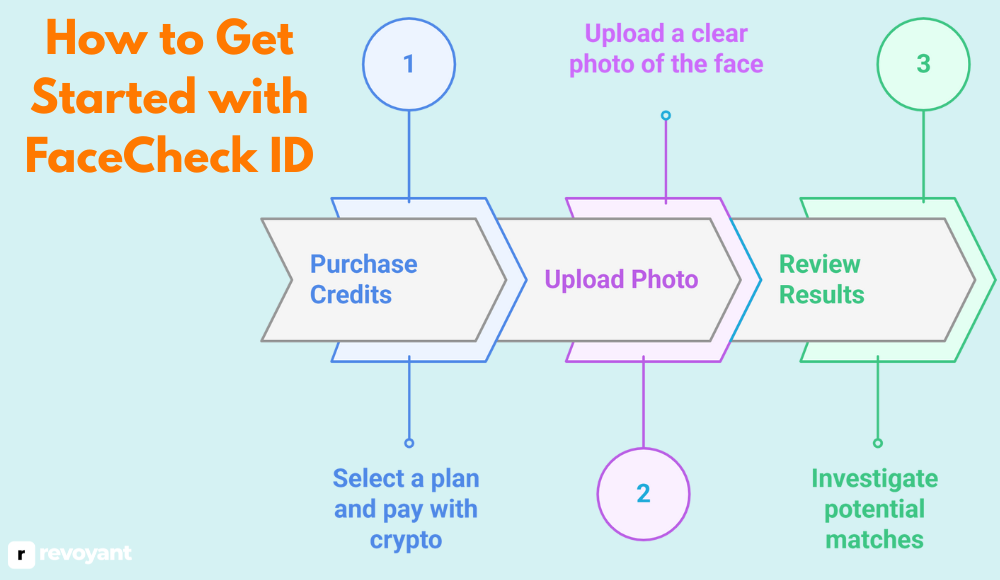
Step 1: Choose and purchase a credit package
Before you can start searching, you’ll need credits. FaceCheck ID runs on a credit-based system, and each face search uses 3 credits. You can choose from several plans depending on how often you plan to use the tool. The packages range from small bundles for quick searches to larger options for ongoing investigations.
- Visit the official FaceCheck ID pricing page
- Choose a plan and pay using Litecoin or Bitcoin
Once the payment is complete, your credits are added to your account, and you’re ready to begin searching. Make sure to use them within the validity period of your selected plan.
Step 2: Upload a clear photo of the face you want to search
The tool performs best when the uploaded photo is clear, well-lit, and shows the full face. Blurry or partial images can reduce the chances of accurate matches. You don’t need to create an account or log in—FaceCheck ID is anonymous and privacy-focused.
- Click the “Upload Photo” button on the homepage
- Select a photo from your device and confirm the upload
The search begins immediately after the photo is uploaded. The tool starts scanning public sources, and results are typically visible within a few seconds.
Step 3: Review search results and investigate matches
Once the search is complete, FaceCheck ID presents you with a gallery of possible matches. Each match includes a thumbnail preview, the source website, and any additional public info available. You can click through to verify the links or dig deeper into the context.
Take time to assess each result carefully. Matches may vary in relevance depending on the photo quality and where the image appears online. If you don’t find what you’re looking for, you can try another image or adjust how the face is framed in the photo. The interface makes it easy to manage and filter results as needed.
Top Alternatives to FaceCheck ID (2025)
While FaceCheck ID is a solid choice for AI-powered face search, it’s not the only option on the market. Depending on what you’re looking for—whether it’s long-term monitoring, broader access, or a different pricing structure—other tools might better suit your needs.
This section explores the top alternatives, how they work, and who they’re best for. Each tool has its own strengths, and comparing them side by side will help you make the right decision based on your goals, usage style, and budget.
PimEyes
PimEyes is a widely used facial recognition tool that allows individuals to search where a face appears online. Known for its fast, AI-powered image search, it’s especially useful for people trying to monitor their digital presence or investigate image misuse.
With a clean dashboard and real-time scanning, PimEyes is trusted by journalists, privacy advocates, and everyday users. Its goal is to bring visibility and control to the way facial images spread across the internet. Whether you’re running a quick check or tracking ongoing use of a photo, the platform is designed to deliver detailed, actionable results.
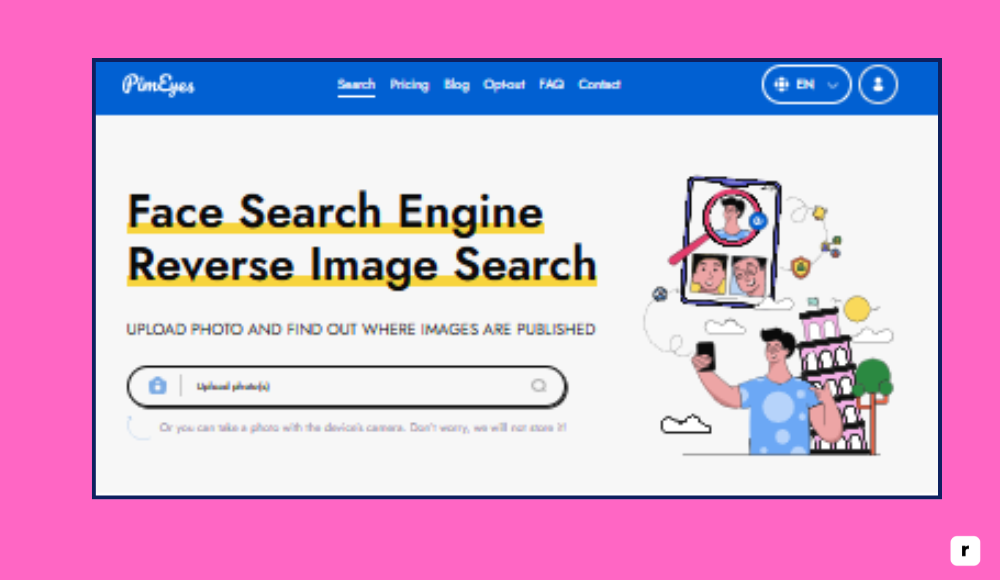
PimEyes Pricing
PimEyes follows a subscription-based model with different monthly plans based on access level and features. Each plan allows unlimited searches during the billing period, with more advanced options offering continuous monitoring and takedown support.
Payments are accepted via credit card or PayPal, and users can cancel or upgrade at any time. The higher-tier plan includes automated alerts for new image matches. It’s ideal for users who expect to search frequently or monitor image usage long-term.
- Open Plus: $29.99/month
- Open Advanced: $79.99/month
- PROtect: $89.99/month
Key Features of PimEyes
PimEyes offers advanced tools for identifying where a face appears online and managing how that image is used. These features are designed to support both personal use and professional-level search tasks.
Whether you’re looking to protect your privacy, verify someone’s identity, or track content over time, PimEyes makes it easy to act on the results. The platform is built around speed, accuracy, and user control. Below are the standout features that make it effective.
- You can upload a clear face photo, and PimEyes will scan publicly accessible websites for visually similar images using AI.
- Each result includes a preview image, the source link, and a confidence score that helps determine how closely it matches.
- The platform lets you set up real-time alerts that notify you when your face appears online in new places.
- There are built-in opt-out and image takedown tools, which give you control over whether your images remain searchable.
- The dashboard supports filters, saved search history, and batch search options, making it efficient for frequent or professional users.
FaceCheck ID vs PimEyes: Which Face Search Tool Wins in 2025?
FaceCheck ID and PimEyes are two of the most popular facial search tools available today, but they take different approaches. FaceCheck ID is ideal for quick, anonymous searches using a credit-based model, while PimEyes focuses on ongoing access and monitoring through subscriptions.
Both tools scan public-facing sites and return photo-based matches, but their features and pricing cater to slightly different user needs. If you’re looking for a more private, one-off tool, FaceCheck ID may be better. If you want ongoing monitoring and full dashboard control, PimEyes could be the smarter choice.
| Feature | FaceCheck ID | PimEyes |
|---|---|---|
| Pricing Model | Credit-based (starts at $6) | Subscription-based (starts at $29.99/month) |
| Payment Methods | Cryptocurrency only | Credit card, PayPal |
| Search Type | Facial recognition across public sources | Facial recognition across public websites |
| Result Detail | Image previews, source links, history | Previews, URLs, confidence scores |
| Monitoring Tools | Alerts and continuous search (paid tiers) | PROtect plan includes alerts and monitoring |
| Privacy Approach | Anonymous use, no login required | Login required, offers opt-out options |
| Best For | Individuals, investigators, casual users | Journalists, professionals, power users |
Clearview AI
Clearview AI is a powerful facial recognition platform primarily designed for use by law enforcement, government agencies, and select corporate clients. Unlike public tools, it offers access to one of the largest known facial image databases, built by collecting billions of publicly available photos from the internet.
The platform is used to identify suspects, solve crimes, and support investigative work. Because of its scale and reach, it’s often considered one of the most advanced facial search technologies available today. However, it’s not intended for everyday consumer use, and access is limited to vetted institutional clients.

Clearview AI Pricing
Clearview AI does not offer public pricing or subscription plans for general users. It operates on an enterprise-level model and sells its services under contracts to official agencies.
- Pricing is custom and negotiated based on the size of the agency, access needs, and search volume.
- There’s no free trial or casual entry point like with other face search tools.
- This model reflects the platform’s law enforcement focus and legal accountability.
- It is not accessible to individual users or small businesses.
Key Features of Clearview AI
Clearview AI provides facial recognition search capabilities using a massive database collected from public web sources, including social media and news sites.
- The system is designed for fast, accurate identification, often used by police or government investigators during criminal cases.
- Its core engine can match low-resolution or partial images by analyzing facial patterns and cross-referencing millions of data points.
- Clients can integrate the platform into internal systems for streamlined evidence management and tracking.
- Due to the sensitivity of its use cases, Clearview AI includes strict legal and regulatory compliance protocols for all customers.
FaceCheck ID vs Clearview AI: Private Use vs Law Enforcement Power
FaceCheck ID and Clearview AI serve very different audiences and purposes. FaceCheck ID is made for individuals and small-scale users who want to search faces online quickly and privately. Clearview AI, on the other hand, is built for large institutions conducting serious investigative work.
While both tools use facial recognition, Clearview’s access to large-scale datasets and enterprise-level features makes it suitable only for regulated, official environments. For general users, FaceCheck ID remains the more accessible and user-friendly option.
| Feature | FaceCheck ID | Clearview AI |
|---|---|---|
| Pricing Model | Credit-based, public access | Enterprise-level contracts only |
| Access Type | Open to individuals | Restricted to law enforcement/government clients |
| Database Reach | Public platforms and profiles | Billions of images scraped from across the web |
| Result Detail | Source links, previews, history | Full-match reports with integration support |
| Privacy Approach | Anonymous use, user-controlled | Legal oversight, internal use only |
| Use Case | Identity checks, fraud prevention | Criminal investigations, suspect tracking |
| Best For | Individuals, casual investigators | Government agencies, law enforcement units |
Social Catfish
Social Catfish is a people search and online identity verification platform that goes beyond facial recognition. It combines image lookup, phone number tracking, email search, and social media scans to help users verify identities and uncover hidden online profiles. Originally built to combat online dating fraud, it’s now widely used by individuals looking to confirm who they’re talking to online.
While not a pure facial recognition tool like FaceCheck ID or PimEyes, it offers broader investigative tools for everyday users. Its versatility makes it especially useful for spotting fake profiles, romance scams, or misleading online personas.
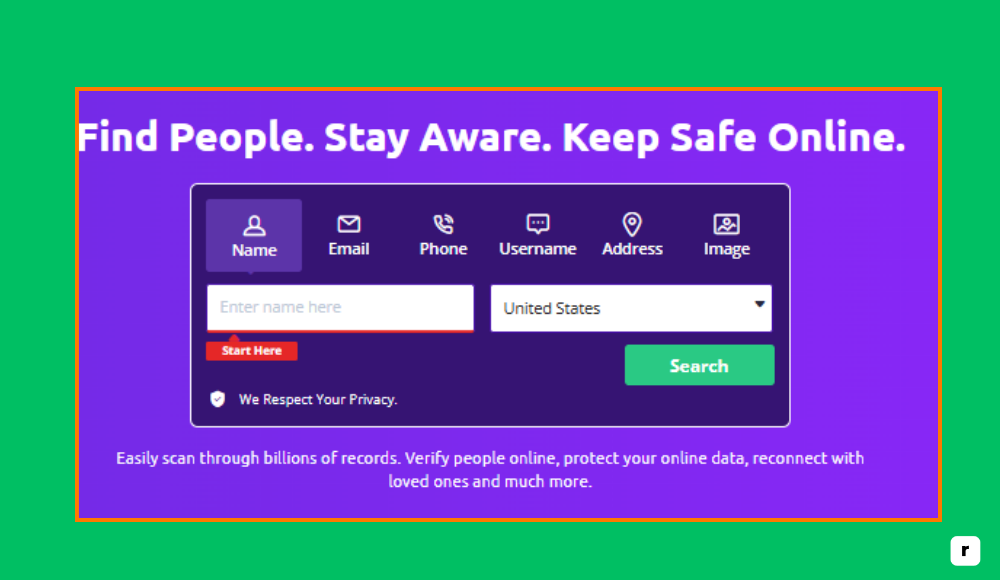
Social Catfish Pricing
Social Catfish offers flexible subscription options for individuals who need quick or continuous access. Plans start at a low monthly fee and scale based on search volume and report depth. Each plan includes access to different search types like images, phone numbers, or emails. You can choose to pay monthly or opt into discounted multi-month packages.
There’s no free plan, but it does offer customer support and easy cancellation.
- One-Month Membership: $27.48/month
- Two-Month Plan: $23.99/month (billed $47.98 every 2 months)
- Phone-only search: $5.73 (one-time)
Key Features of Social Catfish
Social Catfish allows users to reverse search images, phone numbers, emails, and usernames across multiple online databases.
- It pulls public records, social media data, and platform profiles to help verify whether someone is using a fake or stolen identity.
- You can run a photo search to check if an image is being used on multiple sites under different names.
- The platform offers detailed reports including known aliases, connected locations, and even possible relatives.
- Its interface is designed for average users, offering clean navigation, customer help, and guided search results.
FaceCheck ID vs Social Catfish: Facial Search vs Full Identity Lookup
FaceCheck ID focuses purely on facial recognition, offering fast and anonymous face searches. Social Catfish, by contrast, is a multi-tool for verifying online identities using images, phone numbers, emails, and more. If your goal is to match faces specifically, FaceCheck ID is a better fit.
But if you’re looking to investigate someone across multiple data points, Social Catfish offers more flexibility. It’s ideal for users who want to cross-check image searches with background info, especially in online dating or fraud scenarios.
| Feature | FaceCheck ID | Social Catfish |
|---|---|---|
| Pricing Model | Credit-based, starts at $6 | Subscription-based, starts at $27.48/month |
| Search Type | Facial recognition | Image, phone, email, and name search |
| User Access | No login required | Requires account |
| Result Scope | Public websites, social platforms | Public data, social media, and people records |
| Report Depth | Visual matches and links | Full identity reports with contact and history |
| Best For | Quick face matching, privacy-conscious users | Online safety, scam checks, dating verification |
Google Reverse Image Search
Google Reverse Image Search is a free tool that lets users upload or paste an image link to find visually similar images across the internet. While it’s not built for facial recognition, it’s still widely used for simple image verification tasks. The tool works best when you’re checking if a photo has appeared elsewhere online, especially in articles, social media, or stock photo libraries. It doesn’t analyze facial structure like FaceCheck ID or PimEyes but can help uncover where an image came from or if it’s been misused. It’s a good starting point for casual users who want a basic, no-cost solution.
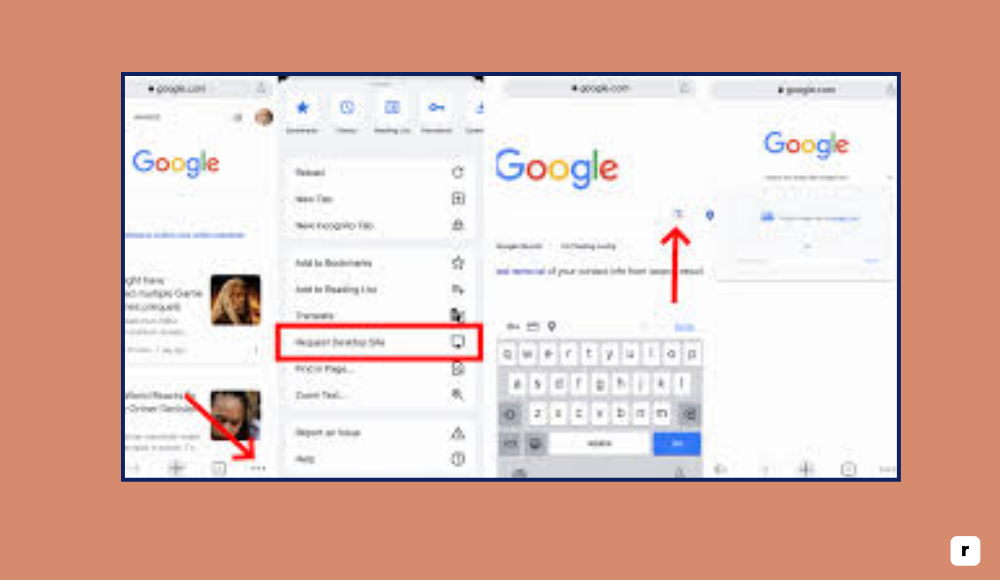
Google Reverse Image Search Pricing
Google Reverse Image Search is completely free to use for all users.
- There’s no subscription, no account required, and no usage limit.
- It’s accessible via desktop and mobile browsers with no special software needed.
- This makes it the most accessible option, especially for one-time or low-stakes searches.
- While powerful in some ways, it lacks the depth and specificity of dedicated facial recognition tools.
Key Features of Google Reverse Image Search
Google allows users to drag and drop an image or paste a URL to quickly search for similar visuals across the web.
- Search results include web pages that use the image, giving users insight into where and how the image has been used.
- The tool shows multiple versions of the image in various sizes and formats, helping users trace its digital history.
- It’s effective for identifying stock photos, celebrity images, or widely circulated pictures that appear in news and media.
- The platform can help detect if an image has been repurposed for fake profiles or misleading content.
- It’s accessible through any browser and doesn’t require an account or login to use.
- Google integrates image search with text results, allowing users to combine visual and keyword research.
- While it doesn’t use facial recognition, it provides an easy, quick way to check if an image is original or copied.
FaceCheck ID vs Google Reverse Image Search: Free Simplicity or Face Accuracy?
FaceCheck ID is built for precision face matching, using AI to find similar faces across the web. Google’s tool is broader and more generic, returning visual matches based on pixel similarities. If you’re trying to find people, FaceCheck ID offers more useful results. But for spotting reused images or verifying photo origins, Google’s tool can be a quick, free solution. It’s best used as a complementary step rather than a replacement for facial recognition platforms.
| Feature | FaceCheck ID | Google Reverse Image Search |
|---|---|---|
| Pricing Model | Credit-based (starts at $6) | Free |
| Search Type | Facial recognition | Visual similarity (non-AI facial search) |
| Facial Accuracy | High, based on facial geometry | Low, not designed for face-specific searches |
| Access Requirements | No login required | No login required |
| Result Output | Face matches with sources and history | Visually similar images with source pages |
| Best For | Finding real people or checking impersonation | Verifying image usage or checking image origin |
FaceCheck ID vs Competitors: Feature-by-Feature Comparison
Choosing the right face search tool depends on what you need—speed, accuracy, access, or investigative depth. This comparison highlights how FaceCheck ID, PimEyes, Clearview AI, and Google Image Search stack up across key factors like pricing, search capabilities, and ideal use cases. Whether you’re verifying a photo, tracking impersonation, or conducting serious research, this table makes it easy to see which tool fits your goals best.
| Tool Name | Pricing | Search Type | Accuracy Level | Best For |
|---|---|---|---|---|
| FaceCheck ID | Credit-based (from $6) | AI facial recognition | High – based on facial geometry | Individuals, private investigators, casual users |
| PimEyes | Subscription (from $29.99/month) | AI facial recognition | High – includes confidence scores | Journalists, content owners, privacy advocates |
| Clearview AI | Enterprise contract | AI facial recognition | Very high – investigation-grade | Law enforcement, government agencies |
| Google Image Search | Free | Visual similarity (not AI-based) | Low – not optimized for faces | Casual users verifying image reuse or sources |
| Social Catfish | Subscription (from $27.48/month) | Image, phone, email, and name search | Moderate – multi-source matching | Scam checks, dating verification, online safety |
Why FaceCheck ID Is the Smartest Choice for Facial Recognition in 2025
With several face search tools on the market, FaceCheck ID stands out by offering the perfect balance of simplicity, accuracy, and privacy. It is designed for individuals who want fast, effective results without complicated logins or expensive subscriptions. Below are the key reasons why FaceCheck ID may be the best fit for your needs.
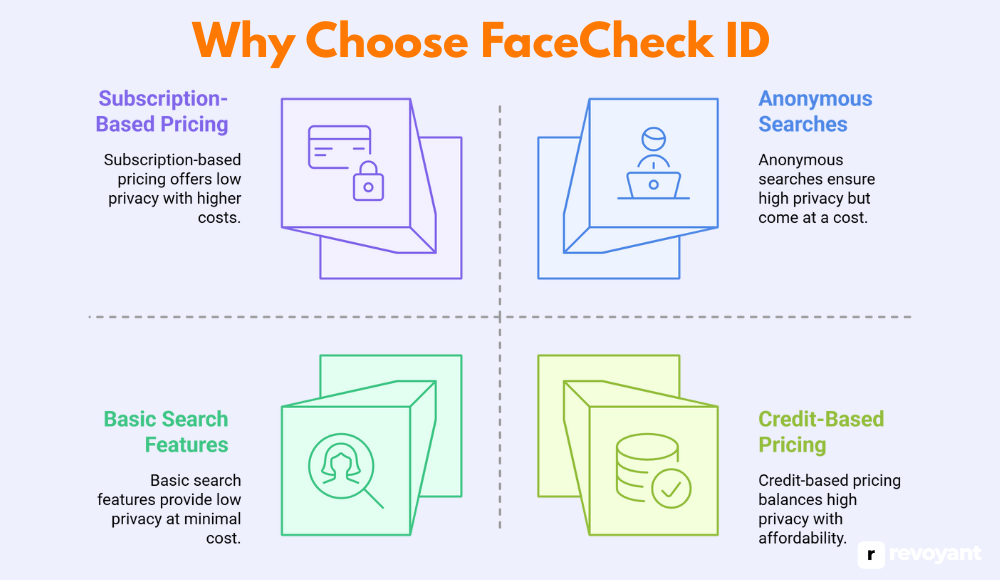
Easy to use and beginner friendly
One of the biggest advantages of FaceCheck ID is how simple it is to use. You don’t need an account, and there’s no learning curve involved. Just upload a clear photo and the tool gets to work. The interface is clean and intuitive, with results shown in a clear, scrollable layout.
This makes it ideal for people who need answers quickly but don’t want to mess around with complex dashboards or filter systems. Whether you’re tech-savvy or a first-time user, you’ll feel comfortable using it right away. It’s a plug-and-play solution that respects your time.
Private, anonymous searches with no login required
Unlike some platforms that require you to sign up or submit personal information, FaceCheck ID doesn’t need you to create an account. All searches are done anonymously, which adds a layer of privacy many users appreciate, especially when searching for sensitive reasons.
You can run a search without linking it to your identity, payment profile, or browsing history. It also doesn’t store your photos long-term, keeping your data secure. This makes it a smart choice for privacy-conscious users who want control over how their image is handled online.
Accurate results with face-first search technology
FaceCheck ID uses AI-powered facial recognition to focus purely on the structure and geometry of a face. That means it can return matches even if the original photo has been cropped, filtered, or posted under a different name.
It doesn’t rely on tags or file names like traditional image search engines. Instead, it analyzes the face itself—eyes, nose, jawline, and other unique identifiers. This approach delivers more reliable matches and fewer irrelevant results. It is especially useful for verifying profiles or spotting impersonation attempts.
Flexible pricing that works for any budget
FaceCheck ID uses a credit-based pricing model, which gives you full control over how much you spend. Instead of locking into a monthly subscription, you simply buy the number of searches you need. Plans start at just $6, and you can choose packages that match your usage, from one-time checks to regular monitoring.
Credits are valid for a set period, so you don’t lose value if you’re not using the tool every day. This flexible approach makes it affordable and accessible whether you’re a casual user or doing frequent searches.
Pro Tips: How to Get the Most Out of FaceCheck ID
Getting accurate and meaningful results from FaceCheck ID isn’t just about uploading a photo—it also depends on how you use the tool. These simple, practical tips can help you improve search accuracy, avoid common mistakes, and make the most of your credits. Whether you’re running a one-time check or using the platform regularly, these suggestions will help you get better outcomes every time.
- Use a high-quality, well-lit photo where the face is fully visible and facing forward. Avoid blurry, dark, or side-profile images for better accuracy.
- Crop the photo so that the face takes up most of the frame. This helps the AI focus on facial features rather than background distractions.
- If your first search doesn’t return the results you expected, try uploading a different photo of the same person from another angle or with better lighting.
- Make sure the person’s eyes, nose, and mouth are visible and not covered by sunglasses, masks, or hats, as these can lower match accuracy.
- Use the search history feature to track previous lookups and compare results over time without needing to re-upload the same image.
- Consider setting up alerts (if available in your plan) to get notified when a new match for a face appears online.
- Be mindful of privacy and ethics—only search for faces when you have a legitimate reason and respect others’ rights to their digital identity.
Final Thoughts: Is FaceCheck ID the Right Tool for You in 2025?
Face recognition tools have come a long way, and FaceCheck ID shows just how powerful and accessible this technology has become. Whether you’re trying to verify someone’s identity, protect your own images, or simply stay informed about where your face appears online, it offers an efficient and privacy-focused solution.
Compared to other tools, FaceCheck ID stands out for its ease of use, no-login access, and flexible pay-as-you-go pricing. It doesn’t overwhelm you with features you don’t need—just accurate results when you need them.
If you’re looking for a face search tool that’s fast, reliable, and puts control in your hands, FaceCheck ID is a smart place to start. Give it a try and see what your face might be telling the internet.
FaceCheck ID FAQs: What Most People Want to Know
Do I need an account to use FaceCheck ID?
No, FaceCheck ID does not require you to create an account. You can run searches anonymously without signing up or entering personal information.
What kind of photos work best for accurate results?
Use clear, front-facing images where the face is well-lit and unobstructed. Avoid blurry, low-resolution, or heavily filtered photos for the best match accuracy.
Can FaceCheck ID find fake social media profiles?
Yes, FaceCheck ID can help spot fake profiles by showing where a face appears online. If someone is using a stolen image, it may lead you to the original source.
Is FaceCheck ID free to use?
FaceCheck ID is not free, but it uses a credit-based system with pricing starting at $6. You only pay for what you use, with no subscriptions required.
Does FaceCheck ID store my uploaded photos?
No, the platform does not permanently store your images. Searches are processed securely, and photos are removed after the search is complete to protect your privacy.




